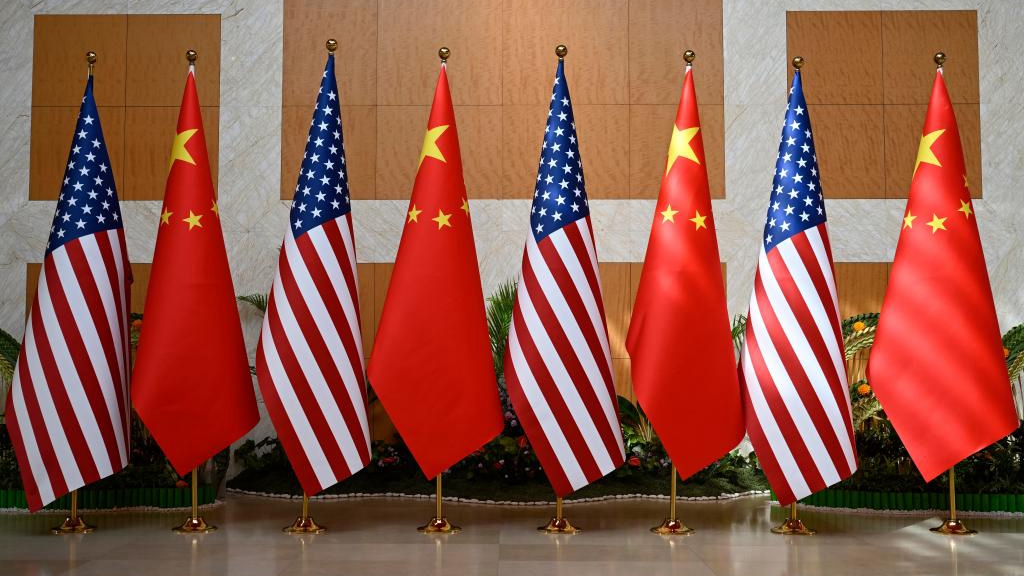
The national flags of China and the United States in Bali, Indonesia, November 14, 2022. /Xinhua
The national flags of China and the United States in Bali, Indonesia, November 14, 2022. /Xinhua
Editor's note: Bradley Blankenship, a special commentator on current affairs for CGTN, is a Prague-based American journalist, political analyst, and freelance reporter. The article reflects the author's opinions and not necessarily the views of CGTN.
China and the U.S. are, according to a Friday report by the Financial Times, opening up new lines of communication to handle contentious issues. Sources speaking to the paper said that the two countries will create a pair of working groups to address Asia-Pacific regional issues and maritime disputes, with a possible third group that could work on broader issues.
The report also said that discussions over the parameters would continue for several months, and one source cautioned that they were not confirmed as of yet. But even though nothing is set in stone, this would undeniably be a positive thing. It wouldn't be a sign of detente between the world's two leading powers but rather a much-needed sign of predictability.
Chinese President Xi Jinping and U.S. President Joe Biden agreed in Bali, Indonesia, last November to set a "floor" under competition between the two countries to avoid "veering into conflict." That meeting came just one month after the U.S. imposed sweeping controls on the export of semiconductors and its manufacturing equipment, which was seen by Beijing as an attempt to kneecap the country's high-tech sector. China responded last month with export restrictions on rare materials, gallium and germanium, critical to chip manufacturing.
As well, at the end of last month, the White House unveiled a $345 million weapons deal to China's Taiwan region. Beijing has consistently voiced concern over Washington supplying weapons to the island, which it says violates Washington's commitment to the one-China principle. President Biden is also anticipated to announce soon an executive order aimed at curbing U.S. investment in China's sectors with military application.
The pace of reciprocal countermeasures on trade and diplomacy is becoming too unpredictable, and it is in both sides' deep interests to communicate through these working groups and build mutual trust and understanding. One important note is that these groups would not be the resumption of formal dialogues that existed in the past, which became too process-oriented. This means that whatever is in the works will have clear and definable goals, e.g., they will have a greater chance of achieving something and building that trust.
For example, the second topic of maritime issues is important. The South China Sea issue will undoubtedly be the major center point of this discussion, and the possibility of agreeing on common rules and practices between Chinese and American military vessels would be a positive step to avoid miscalculations. The lack of communication between the two military forces, at the moment, is one of the major regional issues and could be a conflict flashpoint if left unaddressed.

Fishing boats sail across the Qiongzhou Strait as the summer fishing moratorium ended in the South China Sea, August 16, 2021. /Xinhua
Fishing boats sail across the Qiongzhou Strait as the summer fishing moratorium ended in the South China Sea, August 16, 2021. /Xinhua
On the possibility of "broader issues," there are countless. The two sides would benefit from discussions on cybersecurity, trade, technology restrictions and ease of doing business for each country's firms in the other country. For instance, the U.S. is openly discriminating against competitive Chinese firms and some states are even openly discussing expropriating property from Chinese companies and individuals.
There are many points where communication can help but some ambiguities need to be worked out. For instance, in the working group on "Asia-Pacific regional issues," China will never accept a situation where the Taiwan question is cast as a regional issue and not a purely Chinese internal affair. The U.S. has repeatedly tried to incorporate ambiguity into its one-China policy and then implement this at a regional level in its "Indo-Pacific Strategy." Beijing will never accept this behavior.
Despite the hardening of both sides' positions and the fact that reciprocal countermeasures are in a spiral, the China-U.S. relationship is still important. The two countries have a long history of cooperation, and war does not have to be an inevitability even if mutual distrust is at an all-time high. It is a positive thing to see that, even with how things stand today, both sides still see dialogue as an important tool. It is to be hoped that these working groups are finalized and produce tangible results that reduce the chances of a severe miscalculation.
(If you want to contribute and have specific expertise, please contact us at opinions@cgtn.com. Follow @thouse_opinions on Twitter to discover the latest commentaries in the CGTN Opinion Section.)